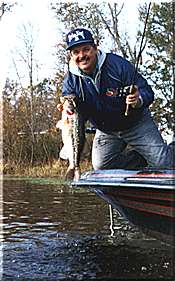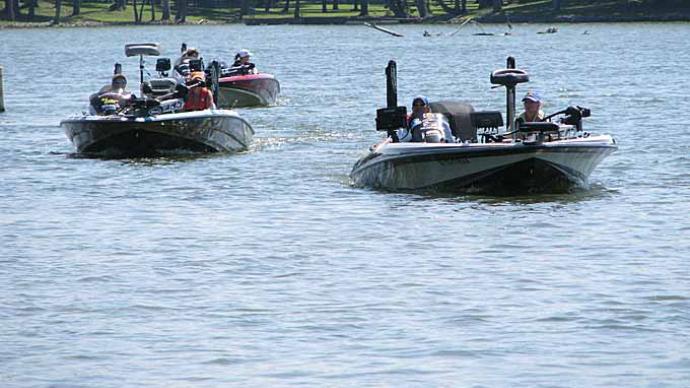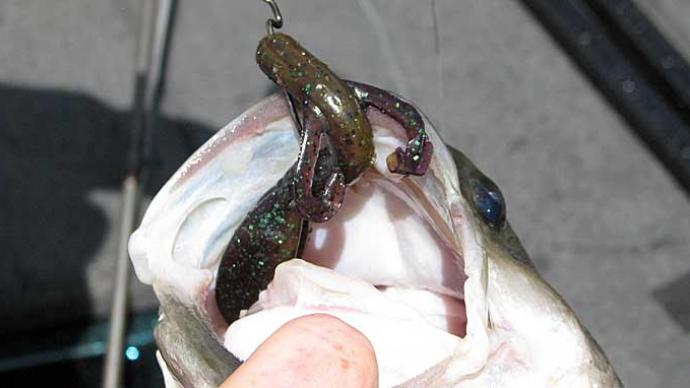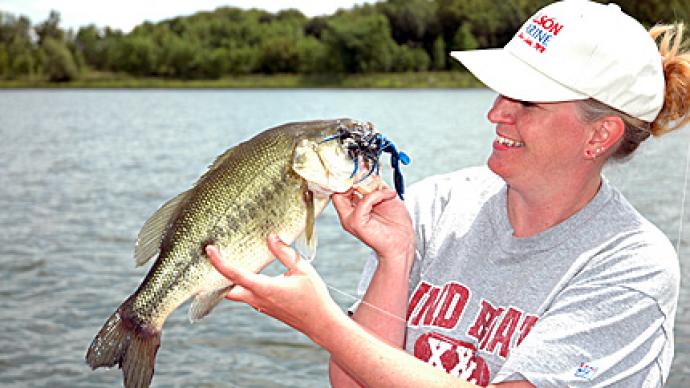
Have you ever noticed, whether it be Club Tournaments, Divisional Tournaments (B.A.S.S. Federation, Red Man, Anglers Choice, etc.), and even the Pro Tournaments, usually you'll see a handful of the same anglers consistently "In-The-Money" most of the time? Then while you're driving home after fishing some of these tournaments without much success, you ask yourself, "What are these anglers doing so different than me?"
These anglers consistently "Cash-In" or "Place in the money." I hope I can help you understand what keeps these anglers successful in tournament fishing.
Bass Tournament fishing is a very competitive sport in a multi-billion dollar industry. More and more anglers every day are joining the ranks of the Tournament competitors. With all these new competitors joining the established ones, the competition seems to be getting tougher and tougher, making it harder to stay on top and consistently "In-The-Money."
I have outlined several tactics you can use to give you the edge over a good portion of the participants. These can stack the cards in your favor for tournament preparation.
Understanding Bass
The better that an angler can understand their quarry, the better or more successful they will catch it. The most critical factor when bass fishing is understanding how a bass reacts to changing conditions and how they use their senses (taste, feel, sight, smell, etc.). There is much to learn about bass, especially when considering water clarity and depth, water temperature, oxygen content, vegetation, seasons, daily conditions, barometric pressure changes, weather fronts, available forage, colors, structure, and there's more!
The first rule of thumb to ALWAYS keep in mind is that bass need three elements to survive:
- FOOD
- OXYGEN
- COVER
Understanding these elements and relating them to some of the situations or conditions listed above should help prepare you for a tournament's "Pre-Fishing" period. This is the start of putting a "Game-Plan" together.
Familiarize Yourself With the Tournament Waters
This can be done by first obtaining a map of the waters you'll be fishing. By understanding how to read a map and relate it to bass fishing, you can just about "Pre-Fish" any body of water before launching the boat. By knowing where the structures are (channels, drops, humps, shallows, flats, depth, points, etc.) and structures are (channels, drops, humps, shallows, flats, depth, points, etc.). By understanding how bass relate to the seasons, daily conditions, and water temperatures, you should eliminate large amounts of water. Understanding the long list of factors I outlined previously, you should key on the areas where bass relate.
Another way to get familiarized with the water is to hire guides or charters. Depending on expenses, I would recommend hiring at least two different guides or charters on any given body of water. That way, you can take the best of the two days to help find areas and patterns. Being a licensed guide and a bass angling instructor, I need to let the truth be known that there are very poor and excellent guides on just about every body of water that holds large-scale bass tournaments; buyer beware.
Another way to learn about the lake is to "fly the water." Go to a nearby municipal or county airport and find a pilot to fly you over the tournament waters. This doesn't cost very much (usually), but you'd be amazed at what you can see from the air that you can't see while sitting on the water.
Color & Bait Patterns
Probably one of the best ways to learn the color and bait patterns of any given body of water would be to visit as many bait and tackle retailers in the area as possible. Peruse the shelves to see what baits and colors are the best sellers. If you visit several of these retailers, you should get an excellent idea of what colors and baits to use, based on the average of all these different places combined.
Watch The Locals
One of the best ways I've found some great Honey Holes in the past is just by observing the locals. While you're on the water and see a boat sitting in one spot for a while, move off in the distance and watch. Remember, some of these locals have fished these waters all their life and aren't sitting in areas to eat lunch!
In the morning, before you hit the water, try to find the local diner where most of the locals eat breakfast. I've often found some great information just by eating at the same place at the same time and by sitting as close as possible. Many anglers like to brag! Just by sitting and minding my own, you can't help but over-hear these locals talking between themselves about the 10-pounder they caught off of Truman's Point using a Spook and so on.
Putting A Game Plan Together
Putting a game plan together for a tournament and sticking to it can make or break most of the anglers in the field. The biggest problem many anglers have is not sticking to a game plan.
Several years ago, I had the great pleasure and company of Shaw Grisby Jr. and his Father (Pops) over at my home for dinner. That evening, I asked Shaw's father (A truly great and knowledgeable man) why he thought most anglers can't seem to stay consistent in tournaments, to which he replied, "They always leave the fish!"
To put it another way, if you're in an area with fish, WHY LEAVE? Give a spot time. The biggest part of pre-fishing is locating fish. So don't just give a spot a few minutes, then leave. I've sat on certain spots for a couple of hours without a bite, then all of a sudden, they turn on, and I've caught limits. I just had to wait them out.
When making your game plan, select an area where you won't have to run miles and miles to secondary spots. Try to keep at least three or four alternate spots within a few minutes of each other.
As I mentioned before, being a Pro Bass Instructor, I've had several students in the past who attended my 3-day Bass Fishing School that just wanted to learn how to "Pre-Fish" a tournament. By teaching them a better understanding of bass behavior and showing them how to put game plans together, different techniques and patterns, color selection, what proper equipment to use, and how to locate bass, these former students are now consistent money winners.
I hope that this article will help you in all your future tournaments and make you a more consistent angler.
Until next time! Take Care & God Bless!
"The Bass Coach" Roger Lee Brown




